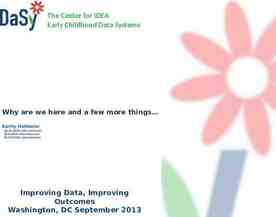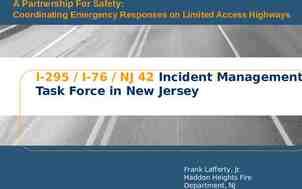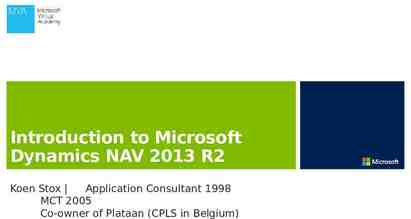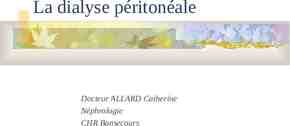Pursuing CAHME Accreditation for an Online Program: Lessons from the
42 Slides2.68 MB

Pursuing CAHME Accreditation for an Online Program: Lessons from the field March 14, 1:00 - 2:00 PM EST AUPHA Online Program Directors Faculty Forum

Moderators Forum chair, Carla Stebbins, Rochester Institute of Technology, Rochester, NY Chair elect, Eric Richardson, University of North Carolina Wilmington, Wilmington, NC Host, Eric Brichto, Commission on Accreditation of Healthcare Management Education (CAHME) The Standard of Excellence in Healthcare Management Education Since 1968 2

Panel Anne Hewitt, Seton Hall University, Nutley, NJ Dawn Oetjen, University of Central Florida, Orlando, FL Steven Szydlowski, University of Scranton, Scranton, PA The Standard of Excellence in Healthcare Management Education Since 1968 3

Agenda 1:00 PM ESTWelcome (Eric B.) 1:05 PM Panel intro/presentations (Carla) Anne Hewitt Dawn Oetjen Steven Szydlowski 1:35 PM Q & A (Eric R.) 1:55 PM AUPHA Annual Meeting – Idea for Forum meeting (Carla) 2:00 PM Closing (Carla) The Standard of Excellence in Healthcare Management Education Since 1968 4

Anne Hewitt SETON HALL The Standard of Excellence in Healthcare Management Education Since 1968 5

SHU Online Learning Model Preparation Steps Specific Criterion Challenges Accreditation Benefits/Challenges CAHME Lessons Learned

MHA Overview MHA Program at Seton Hall University Since 1997 OnCampus 42 Credits (All Required) across 18 courses 148 Students enrolled (Online and On-campus, 2017-18) 59 sections offered (Online and On-campus, 2017-18) Only accredited program in New Jersey.

Program Snapshot Initial CAHME accreditation in 2014, now reaccredited until 2023. MHA located in School of Health and Medical Sciences at an Interprofessional Health Sciences campus with a new School of Medicine and a College of Nursing. Both learning formats (online/hybrid and on-campus) begun in 1997. 42 credits, all required; same for both program delivery formats

Online/Hybrid Immersive Residency SHU-MHA Cohort model – 2 year time frame, courses offered every 7 weeks with week off and 3 immersive on-campus residencies. Immersive residencies conducted at orientation, midprogram and final graduation. Primarily asynchronous as 3 -1 credit courses are completed in immersive experiences Each asynchronous course requires 2 webinar sessions – date/time and content outlined in the syllabus

Preparation & Motivation Critical Questions 1. Will your administration support your accreditation process with an appropriate resource commitment? 2. Can you complete the necessary steps to critically assess your internal and external environment? 3. Do you have support from your faculty, alumni, advisory boards, preceptors, and industry partners? 4. Can you provide a solid rationale for the necessity of CAHME accreditation for your online/hybrid program? 5. Have established a realistic timeline for program eligibility and the full CAHME accreditation process?

Most Challenging CAHME Criterion for SHU-MHA Mission Statement Curriculum Alignment Competency Development Assessment SHU HybridModel

MHA Mission Statement The student-centered MHA prepares early and mid-career individuals from diverse backgrounds to be competent health managers and leaders for a broad spectrum of health care organizations. Delivered both on-campus and online, the essential MHA program emphasizes experiential learning opportunities, reflects SHU's Catholic tradition, and strives to instill the professionalism and values required of servant leaders to all students.

MHA Curriculum (42 credits – ALL REQUIRED) REQUIRED COURSES (Credits) 6002 – Research Methods and Statistics (3) 6005 – Financial Mgt. & Accounting (3) 7513 – Healthcare Management. (3) 7517 – Healthcare Fin. Mgt. (2) 7519 – Population Health Mgt. (3) 7520 – Healthcare Data Analytics (3) 7521 – Healthcare Systems (2) 7522 – Healthcare Policy (2) 8515 – Health Economics (2) 8517 – Strategic Planning & Marketing (3) 8518 – Legal Issues in Healthcare (3) 8521 – Quality Mgt. (3) 8523 – Ethics in Healthcare (2) 8530 – Emergency Management (2) 8720 – Professionalism and Leadership I (1) 8721 -- Professionalism and Leadership II (1) 8722 -- Professionalism and Leadership III (1) CAPSTONE (SELECT ONE) 7991 – Internship (3) 7992 – Practicum (3) 7993 - Research Seminar (3) 7997 - Capstone Project (3)

MHA Competency Domains Leadership in the Healthcare Environment Critical Thinking in a Complex and Competitive Environment Management in the Healthcare Environment Population Health within the Healthcare Environment Communication Professionalism and Ethics

Assessment Tools Blackboard Suite of Reports Levels of Assessment Individual level - Attainment of competency by student at the level planned. Course level - Achievement of competencies linked to course objectives. Program level - Assessments external to faculty Assessment Data for DecisionMaking Competency-attainment reported in addition to grade Report - level of competencyattainment Use of assessment data for quality improvement

MHA Program Level Assessment Competency domains

Value of Accreditation BENEFITS Cannot overstate the value of self-study for quality improvement and opportunity to compare one’s program with peers Competitive marketing position Peer School Recognition and Award Opportunities CHALLENGES Required Time, Expertise and Resource commitment to the process University may not always accept accreditation status for Program Review Sustainability

Lessons Learned Quality Attainment & Student Focus Key Lesson 1 Administrative Support Key Lesson 2 Alignment of Program Components Key Lesson 3 Assessment Support Key Lesson 4 – Attend CAHME Boot Camps/ Consider Outside Consultant Key Lesson 5 – As Program Director you carry the accreditation!

Dawn Oetjen UNIVERSITY OF CENTRAL FLORIDA The Standard of Excellence in Healthcare Management Education Since 1968 19

Program Overview ME H A C ited d e r Acc Bachelor of Science in Health Services HA AUP fied ti Administration Cer (BSHSA) Executive Master of Health Administration (eMHA) Master of Health Administration (MHA) ME H A C ted i d e r Acc Department of Health Management and Informatics, College of Community Innovation and Education The Standard of Excellence in Healthcare Management Education Since 1968 20

Program Overview eMHA Program Director: Dawn Oetjen Credit hours: 44 Online only Full-time, cohort model, lock-step 3 years professional experience required 2 Tracks MHA The Standard of Excellence in Healthcare Management Education Since 1968 Program Director: Kourtney Nieves Credit hours: 51 Day/Night classes Full-time or Part-time Required Internship 21

Program Overview Department of Health Management and Informatics: BSHSA MHA eMHA BSHIIM MSHCI PhD-PA 33 faculty, 4 program assistants, 5 staff, 2 internship coordinators, 15 adjuncts, GTAs/RAs The Standard of Excellence in Healthcare Management Education Since 1968 22

Program Overview Core: 40 Credit Hours HSA 6766 - Health Care Statistics and Research HSA 6345 - Leadership for Health Care Executives HSA 6179 - Financial Accounting for Health Care Managers HSA 6346 - Health Care Organizational Behavior and Human Resource Management HSA 6505 - Health Care Quality and Risk Management HSA 6178 - Financial Management for Health Care Managers HSA 6197C - Health Care Informatics for Health Care Leaders HSA 6156 - Health Care Economics and Policy HSA 6520 - Epidemiology and Health Planning HSA 6555 - Health Care Ethics and Law Capstone: 4 Credit Hours The Standard of Excellence in Healthcare Management Education Since 1968 23

Program Overview HLA-modified Competency Model 20 competencies Assessed at individual, course, and program level The Standard of Excellence in Healthcare Management Education Since 1968 24

Program’s History with Accreditation Accreditation Cycle MHA first accredited in 2004 Last site visit Fall 2013 eMHA accredited as a track of existing MHA Fall 2015 Next site visit Fall 2020 Why pursue CAHME Accreditation? The program recognizes the value of being an accredited program as it ensures the highest quality educational standards for our students. The Standard of Excellence in Healthcare Management Education Since 1968 25

Value of CAHME Accreditation Benefits recognition by key stakeholders of the CAHME accreditation seal and that it ensures we comply with industry wide competencies as we deliver high quality education Ability for our students to compete for nationally competitive administrative fellowships Strong competency based standards to ensure our students are getting the most relevant content necessary to be competent, high quality healthcare administrators Challenges Process can be time consuming Any program changes must be made with CAHME standards in mind The Standard of Excellence in Healthcare Management Education Since 1968 26

Value of CAHME Accreditation If you had the choice to pursue/not pursue or maintain/not maintain accreditation would you? Why? Yes, I would, as having CAHME accreditation has allowed our students to compete for nationally competitive administrative fellowships with great success. This is a testament to our commitment to delivering high quality education that ensures they are obtaining the competencies they need upon graduation. The Standard of Excellence in Healthcare Management Education Since 1968 27
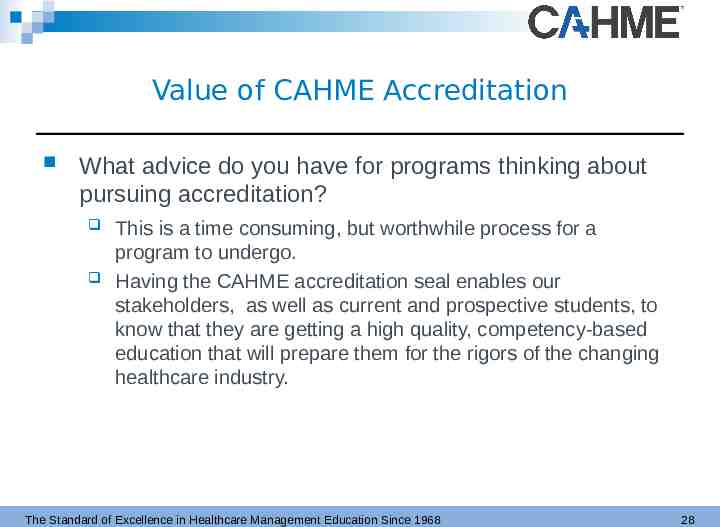
Value of CAHME Accreditation What advice do you have for programs thinking about pursuing accreditation? This is a time consuming, but worthwhile process for a program to undergo. Having the CAHME accreditation seal enables our stakeholders, as well as current and prospective students, to know that they are getting a high quality, competency-based education that will prepare them for the rigors of the changing healthcare industry. The Standard of Excellence in Healthcare Management Education Since 1968 28

Overall Experience with CAHME Accreditation How was/is the accreditation experience working with CAHME? Are they user-friendly? Collegial? Positive, collegial, informative, user-friendly platform Does the accreditation process add value to what you do/offer your stakeholders? Why or why not? Value-added process, peer review Our students, faculty, and community partners recognize the value of the CAHME accreditation The Standard of Excellence in Healthcare Management Education Since 1968 29

Steven Szydlowski UNIVERSITY OF SCRANTON The Standard of Excellence in Healthcare Management Education Since 1968 30
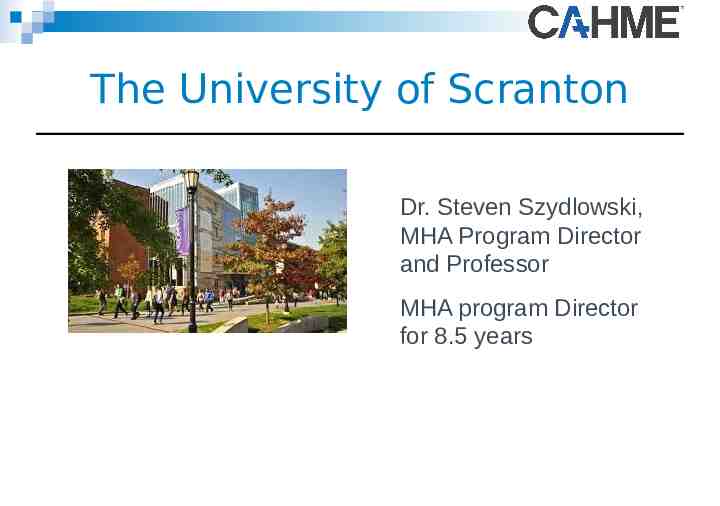
The University of Scranton Dr. Steven Szydlowski, MHA Program Director and Professor MHA program Director for 8.5 years
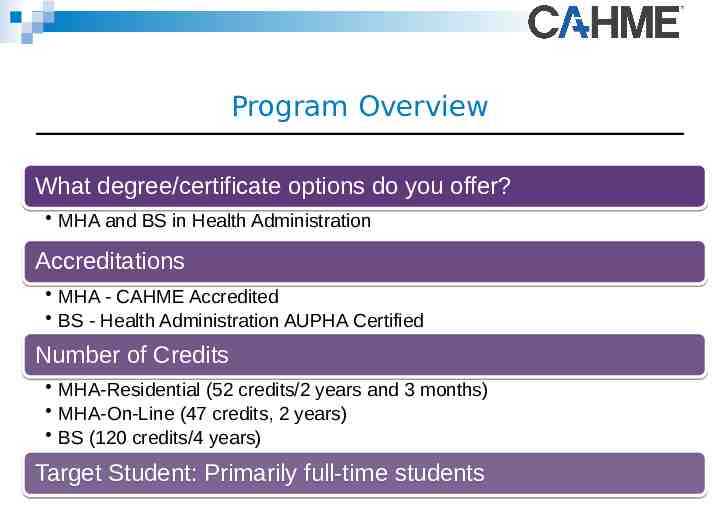
Program Overview What degree/certificate options do you offer? MHA and BS in Health Administration Accreditations MHA - CAHME Accredited BS - Health Administration AUPHA Certified Number of Credits MHA-Residential (52 credits/2 years and 3 months) MHA-On-Line (47 credits, 2 years) BS (120 credits/4 years) Target Student: Primarily full-time students
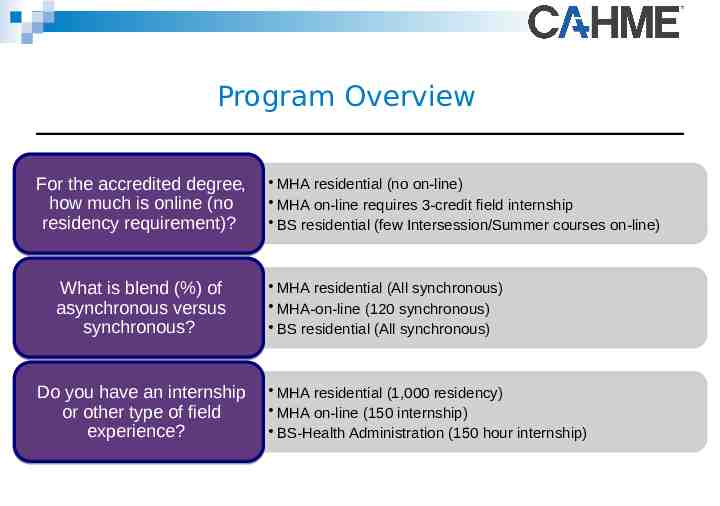
Program Overview For the accredited degree, how much is online (no residency requirement)? What is blend (%) of asynchronous versus synchronous? Do you have an internship or other type of field experience? MHA residential (no on-line) MHA on-line requires 3-credit field internship BS residential (few Intersession/Summer courses on-line) MHA residential (All synchronous) MHA-on-line (120 synchronous) BS residential (All synchronous) MHA residential (1,000 residency) MHA on-line (150 internship) BS-Health Administration (150 hour internship)
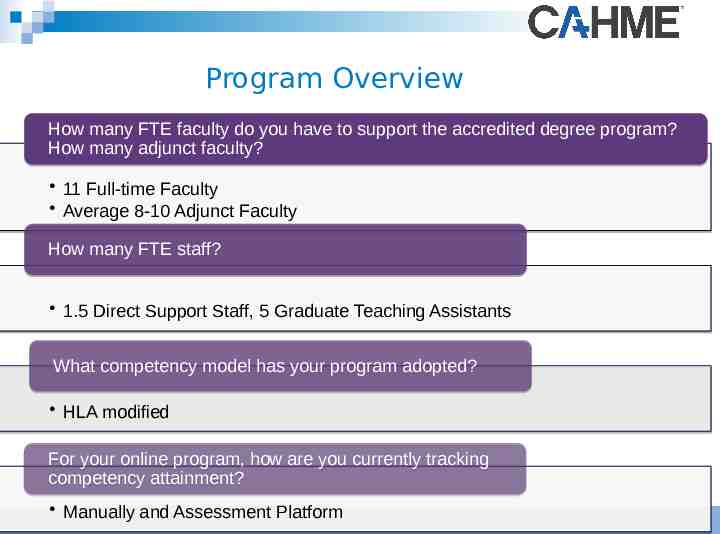
Program Overview How many FTE faculty do you have to support the accredited degree program? How many adjunct faculty? 11 Full-time Faculty Average 8-10 Adjunct Faculty How many FTE staff? 1.5 Direct Support Staff, 5 Graduate Teaching Assistants What competency model has your program adopted? HLA modified For your online program, how are you currently tracking competency attainment? Manually and Assessment Platform
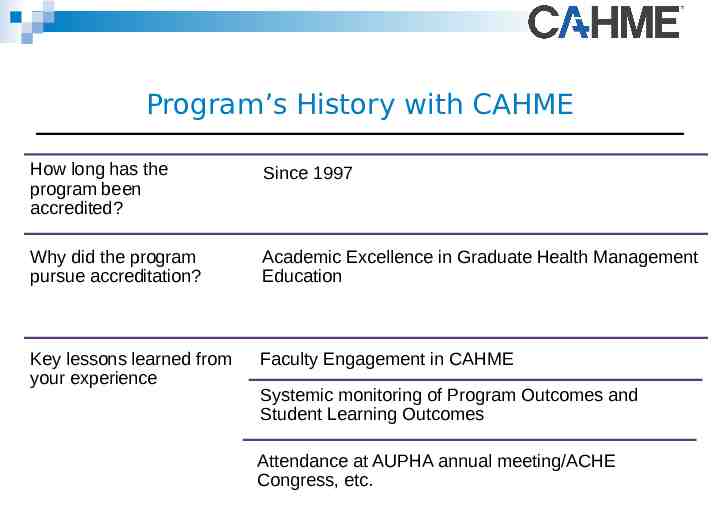
Program’s History with CAHME How long has the program been accredited? Since 1997 Why did the program pursue accreditation? Academic Excellence in Graduate Health Management Education Key lessons learned from your experience Faculty Engagement in CAHME Systemic monitoring of Program Outcomes and Student Learning Outcomes Attendance at AUPHA annual meeting/ACHE Congress, etc.
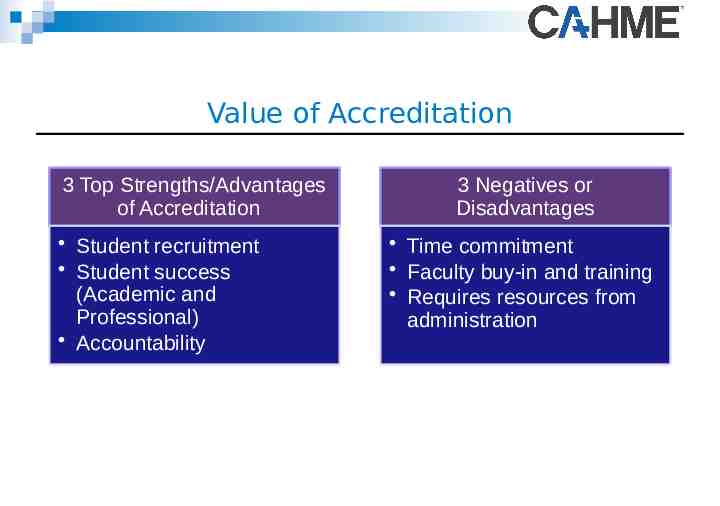
Value of Accreditation 3 Top Strengths/Advantages of Accreditation Student recruitment Student success (Academic and Professional) Accountability 3 Negatives or Disadvantages Time commitment Faculty buy-in and training Requires resources from administration
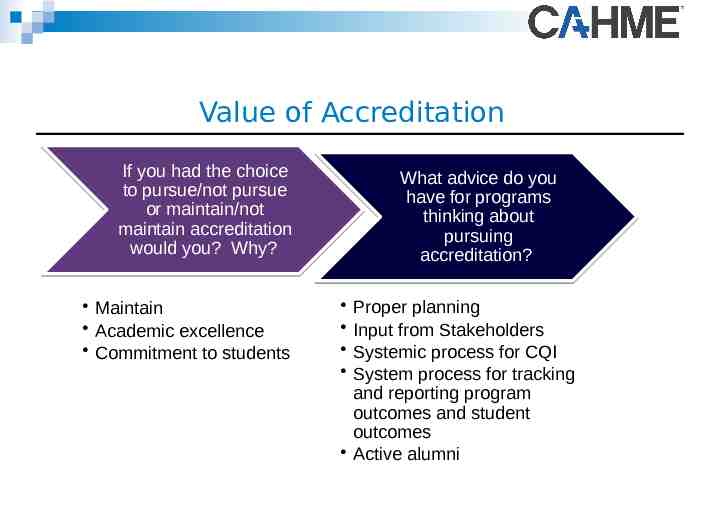
Value of Accreditation If you had the choice to pursue/not pursue or maintain/not maintain accreditation would you? Why? Maintain Academic excellence Commitment to students What advice do you have for programs thinking about pursuing accreditation? Proper planning Input from Stakeholders Systemic process for CQI System process for tracking and reporting program outcomes and student outcomes Active alumni
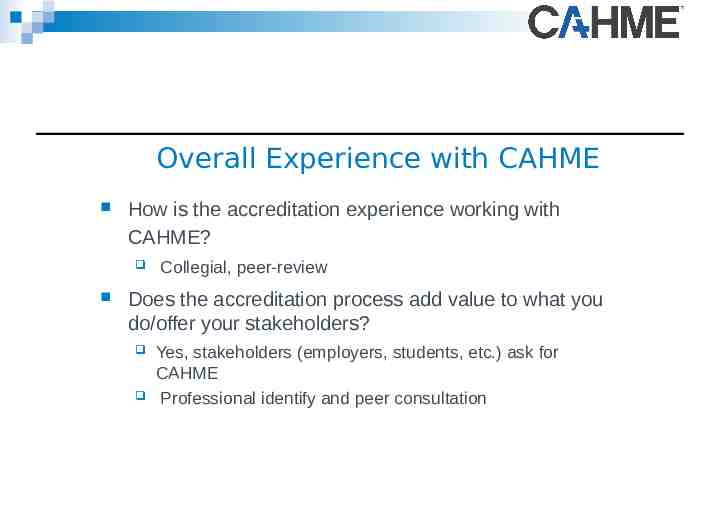
Overall Experience with CAHME How is the accreditation experience working with CAHME? Collegial, peer-review Does the accreditation process add value to what you do/offer your stakeholders? Yes, stakeholders (employers, students, etc.) ask for CAHME Professional identify and peer consultation
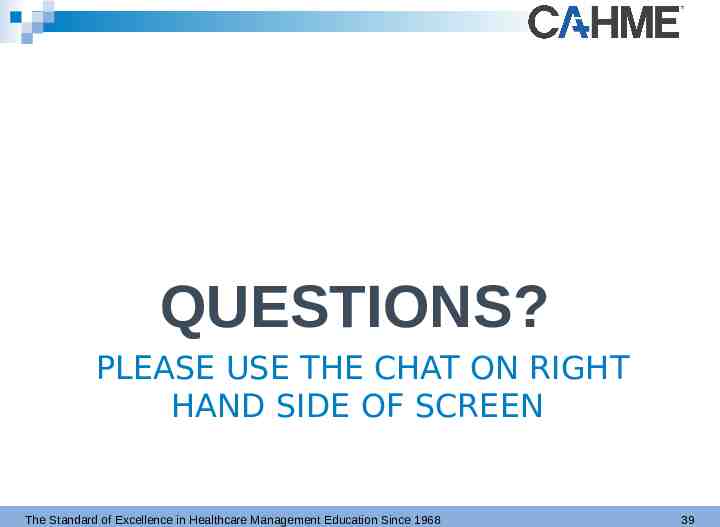
QUESTIONS? PLEASE USE THE CHAT ON RIGHT HAND SIDE OF SCREEN The Standard of Excellence in Healthcare Management Education Since 1968 39
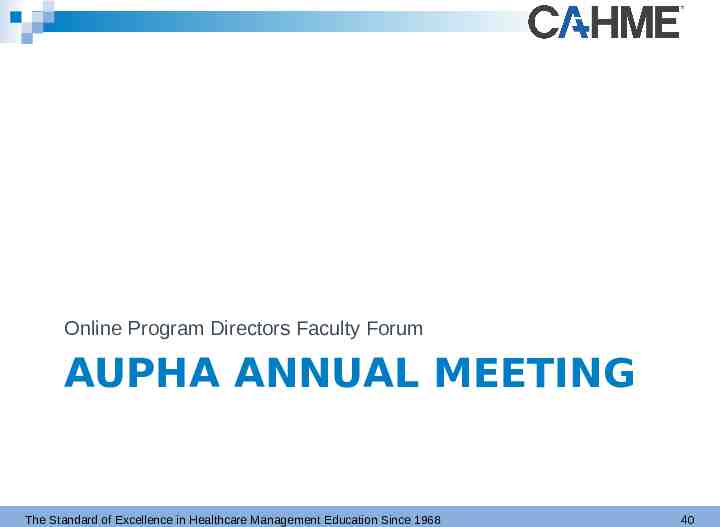
Online Program Directors Faculty Forum AUPHA ANNUAL MEETING The Standard of Excellence in Healthcare Management Education Since 1968 40
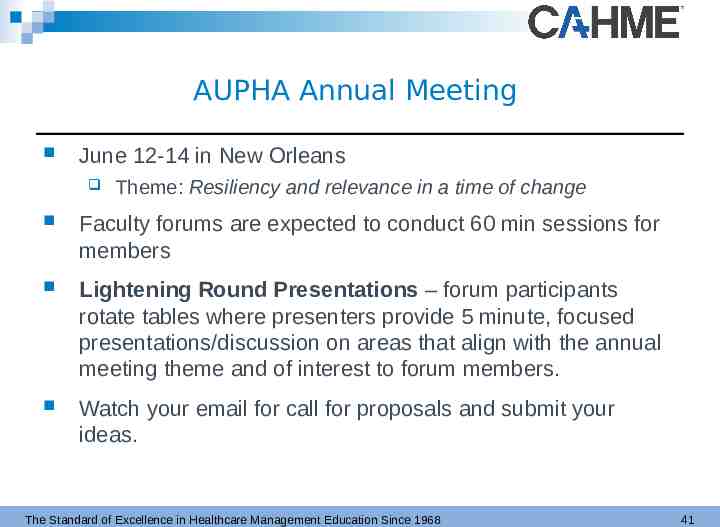
AUPHA Annual Meeting June 12-14 in New Orleans Theme: Resiliency and relevance in a time of change Faculty forums are expected to conduct 60 min sessions for members Lightening Round Presentations – forum participants rotate tables where presenters provide 5 minute, focused presentations/discussion on areas that align with the annual meeting theme and of interest to forum members. Watch your email for call for proposals and submit your ideas. The Standard of Excellence in Healthcare Management Education Since 1968 41
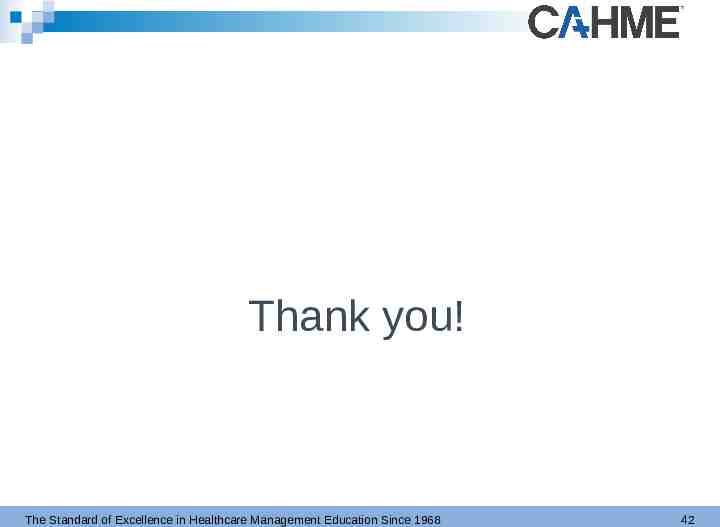
Thank you! The Standard of Excellence in Healthcare Management Education Since 1968 42

